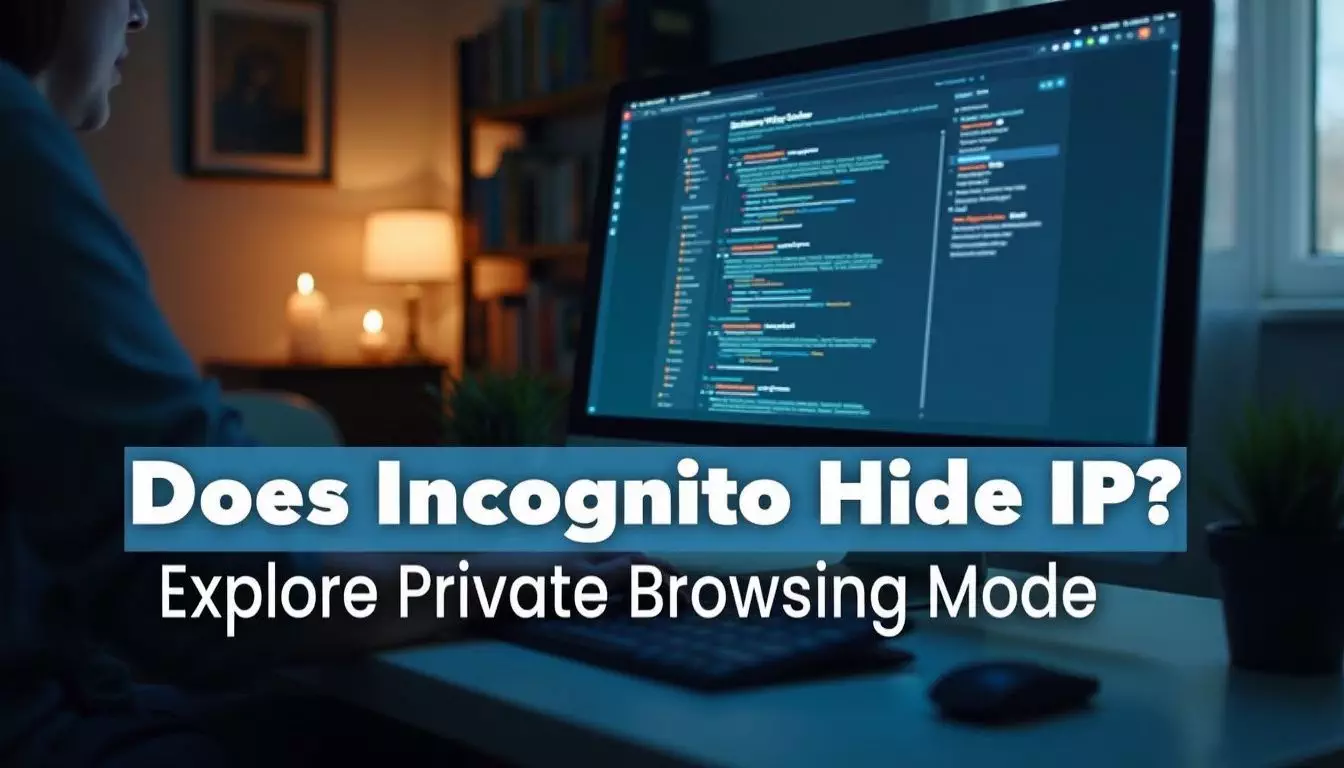Incognito mode doesn’t keep your IP address secret. Many people think that private browsing will hide their online identity, but this isn’t true. 3 Your Internet Service Provider (ISP) and websites can still see where you’re going online. 1
Alex Herrick, co-founder of Web Design Booth, has over a decade of experience in web design and digital security. He emphasizes the importance of understanding browser privacy features.
So, does Incognito hide IP address? No, it doesn’t. While it can help prevent your browser from saving your browsing history, it doesn’t mask your IP address. You need stronger tools to stay truly hidden online. Learn more about it here! 2
Key Takeaways
- Incognito mode doesn’t hide your IP address from websites or internet providers.
- VPNs offer better protection by masking your IP and encrypting your data.
- Websites can still track users in incognito mode through techniques like browser fingerprinting.
- Combining a VPN with incognito mode provides stronger online privacy.
- Safe online habits, like using strong passwords and avoiding public Wi-Fi, help protect your IP long-term.
Understanding Incognito Mode and Its Impact on IP Anonymity

Incognito mode keeps your browsing private on your device. But it doesn’t hide your IP address from websites or your internet provider.
Defining Incognito Mode: How It Works in Popular Browsers
Incognito mode keeps your browsing private on shared devices. Chrome, Firefox, and Safari offer this feature. 2 It stops saving your history, cookies, and site data. But it doesn’t hide your IP address from websites.
Incognito mode is like wearing a mask at a party. You’re still there, but people might not know it’s you. – Alex Herrick
Incognito mode can stop websites from tracking you online. When you close it, your normal browsing will still be private. 1
The Myth of Complete Anonymity in Incognito Mode
Private browsing mode doesn’t offer total anonymity. Users often think Incognito hides everything, but it’s not true. Websites, ISPs, and system admins can still see what you do online. 3
Your IP address stays visible too. A court case, Brown v. Google, showed Incognito’s privacy limits. 4
Digital fingerprinting creates unique user profiles, even in private browsing. This tech tracks you across sites. It uses your device info and browsing habits. So, Incognito can’t stop all tracking. 3 It’s good for basic privacy, but not perfect. For better protection, try a VPN or Tor browser.
Comparing Incognito with Standard Browsing: Privacy Features and Gaps
Incognito mode offers limited privacy compared to standard browsing.
Here’s a breakdown of key differences:
| Feature | Standard Browsing | Incognito Mode |
|---|---|---|
| Browser History | Saved | Not saved |
| Cookies | Stored | Deleted after session |
| Form Data | Remembered | Not saved |
| IP Address Visibility | Visible | Still visible |
| ISP Tracking | Possible | Still possible |
| Website Sign-ins | Remembered | Not saved |
| Ad Targeting | Active | Still active |
Incognito mode doesn’t hide users from their ISPs or prevent websites from seeing their IP address. It only stops local storage of browsing data. 2 It is suggested that, for complete anonymity, users need additional tools like VPNs. 1
The Intricacies of How Browsers Handle Your IP Address

Browsers play a key role in how your IP address is shown online. They can’t hide it fully, even in private mode.
Browser’s Role in IP Address Exposure During Private Browsing
Browsers play a key role in IP address exposure, even in private mode. Chrome, Firefox, Edge, and Brave can still track users’ online activities. These browsers don’t hide IP addresses from websites or network observers.
Users often think incognito mode offers full privacy, but it only hides browsing history on the device. 5
Incognito mode is like wearing a disguise in public – people can’t see your face, but they can still see you’re there. 2
Big tech companies can still see what you do online, even when you’re using incognito mode. They can find out your computer’s address, which is like a unique ID. If you sign in to a website while in incognito, it can still know who you are.
To stay truly hidden online, you need extra tools. Let’s see how websites can track your computer’s address even when you’re trying to be private.
Techniques Used by Websites to Track IP Addresses Despite Incognito Mode
Websites use sneaky tricks to find out your computer’s address, even when you’re using incognito mode. This lets them know who you are and watch what you do online, even if you try to be private. 6
- Browser fingerprinting: Sites collect unique data about a user’s browser and device settings to create a digital “fingerprint.”
- WebRTC leaks: Real-time communication features in browsers can reveal a user’s true IP address, bypassing incognito protections.
- Supercookies: Special tracking files stored outside the browser’s control persist even after clearing regular cookies. 2
- Canvas fingerprinting: Websites use HTML5 canvas elements to draw invisible images, creating unique identifiers based on hardware and software differences.
- DNS prefetching: Browsers may leak IP information through DNS requests, even in private browsing modes.
- Timing attacks: Sites measure the time to load certain resources, potentially revealing cached content and user identity.
- ETags: These unique identifiers for web resources can track users across sessions and browsers.
- HSTS supercookies: HTTP Strict Transport Security settings can be exploited to create persistent identifiers.
- Browser extensions: Some add-ons may continue to function in incognito mode, potentially exposing user data.
- Local storage: Websites can use browser storage mechanisms that persist across incognito sessions.
VPNs: A Reliable Solution for Hiding Your IP Address

VPNs offer a powerful way to hide your IP address. They mask your actual location and encrypt your data, making it hard for others to track you online.
How VPNs Provide an Additional Layer of Anonymity
VPNs create a secret tunnel between your device and their servers. This tunnel hides your actual IP address from websites and trackers. Your internet traffic gets encrypted, making it hard for others to see what you’re doing online.
ISPs can only tell that you’re using a VPN, not what sites you visit. 7
A good VPN masks your location, too. It makes you look like you’re browsing from somewhere else. This extra layer of privacy stops websites, hackers, and ad companies from following your online moves. With a VPN, you can surf more freely without leaving digital footprints behind. 8
Integrating VPNs with Browser Incognito Mode for Enhanced Privacy
Using a VPN with incognito mode makes you really private online. CyberGhost VPN has a lot of servers in many countries that hide your computer’s address. This stops websites, trackers, and hackers from knowing where you are.
These features, along with incognito mode, make you pretty safe online. You can browse the web without worrying about leaving a trail. 5
A good VPN like CyberGhost has a strict no-logs policy. This means they don’t keep records of what you do online. They also use an automatic kill switch to cut your internet if the VPN drops.
These features, along with incognito mode, make you pretty safe online. You can browse the web without worrying about leaving a trail. 9
Choosing the Right VPN for Optimal Online Anonymity
Using a VPN with incognito mode makes you even more private online. Choosing the right VPN is important to stay hidden online.
- Look for strong encryption: A top VPN uses AES-256 encryption to protect data. 7
- Check server network: CyberGhost offers 9,000 servers in 91 countries for wide coverage.
- Verify no-logs policy: Pick a VPN with a strict no-logs rule to keep activities private. 7
- Assess speed: Fast servers ensure smooth browsing and streaming.
- Consider user-friendly interface: Easy-to-use apps make VPN use simple.
- Evaluate extra features: An automatic kill switch adds security if connection drops.
- Compare pricing: Balance cost with features for the best value.
- Read user reviews: Real experiences help gauge VPN reliability.
- Test free trials: Try before buying to ensure the VPN meets your needs.
- Check device compatibility: Ensure the VPN works on all your devices. 10
Limitations of Incognito Mode in Achieving Complete Online Privacy

Incognito mode can’t hide your IP or stop all tracking. It’s just a start for privacy. Want to know more? Keep reading!
Understanding What Incognito Mode Can and Cannot Protect
Incognito mode offers some privacy perks. It stops browsers from saving history, cookies, and site data. 2 Users stay logged out when they start it up. 2 But it’s not a magic shield.
Websites, search engines, and internet providers can still see what you do online.7 Your IP address stays visible too.
For better privacy, extra steps are needed. A VPN or proxy server can hide your IP. These tools mask your actual location. Incognito mode alone won’t protect against malware or phishing attacks.
It’s just one piece of the privacy puzzle. Smart online habits and the right tools make a big difference in staying safe on the web.
Real-world Scenarios Where Incognito Mode Falls Short on Privacy
Incognito mode doesn’t always keep you hidden online.
Here are five situations where it falls short:
- ISP tracking: Internet service providers can still see all web traffic, including IP addresses and visited sites. This allows them to build user profiles and sell data to advertisers. 11
- Website data collection: Websites can still see what you do online. They can still find out your computer’s address. They often use cookies and browser fingerprinting to track you. 2
- Malware exposure: Incognito mode can’t protect you from bad software.
- Public Wi-Fi vulnerabilities: On public Wi-Fi networks, hackers can steal your personal information if you’re not using a VPN.
- Employer monitoring: At work, your company can see what websites you visit and what you do online, even when you’re using private browsing.
Practical Tips for Enhancing Online Anonymity Beyond Incognito Mode

Boost your online privacy with smart tricks beyond Incognito Mode. Learn how to shield your digital footprint and surf the web safely… Read on for more tips!
Using Proxy Servers in Conjunction with Incognito Mode
Proxy servers boost privacy when used with incognito mode. 12 They hide IP addresses and encrypt web traffic. Paid proxies offer better security than free ones.
Free proxies can be risky. They may have slow speeds and expose users to malware. Paid options are more reliable and secure. The team at Web Design Booth advises clients to invest in quality proxy services for the best results. 2
Leveraging Browser Extensions Designed for Privacy Protection
Browser extensions boost online privacy beyond incognito mode. 2 These tools block trackers and shield user data.
- Ad blockers: Stop ads and trackers from loading on web pages
- VPN extensions: Hide IP address and encrypt internet traffic 2
- Anti-tracking tools: Prevent websites from collecting user data
- Password managers: secure login info and generate strong passwords
- HTTPS Everywhere: Force websites to use secure connections
- Cookie cleaners: Remove tracking cookies after browsing sessions
- Script blockers: Control which scripts run on visited websites
- Fingerprint spoofers: Mask browser fingerprints to avoid tracking
- Email privacy guards: Protect email content and block trackers
- Secure file sharing: Encrypt and safely share sensitive documents
Adopting Safe Online Habits for Long-term IP Address Protection
Safe online habits protect your IP address for years. These habits keep your data private and secure.
- Use strong passwords: Mix letters, numbers, and symbols. Change them often.
- Enable two-factor authentication (2FA): Add an extra layer of security to your accounts.
- Limit access to private info: Share personal data only on trusted sites.
- Update security measures: Keep software and systems current with the latest patches.
- Encrypt your data: Use methods like public-key or symmetric-key encryption.
- Employ a quality proxy: Hide your IP address from prying eyes.
- Use a Virtual Private Network (VPN): Mask your IP and encrypt your internet traffic.
- Clear browser history and cookies: Remove traces of your online activities. 2
- Avoid public Wi-Fi: Use mobile data or a secure home network instead.
- Be careful with email links: Don’t click on suspicious links or download unknown files.
- Use secure websites: Look for “https” in the URL for encrypted connections.
- Install an ad blocker: Reduce tracking and malware risks from online ads.
- Disable location services: Prevent apps from tracking your physical location.
- Use private browsing mode: Reduce local data storage on your device. 5
- Regularly check privacy settings: Adjust social media and app permissions often.
Conclusion
Incognito mode doesn’t hide your IP address. Websites can still see it. For real privacy, use a VPN. It masks your IP and encrypts data. Stay safe online by combining tools and smart habits.
FAQs
1. Does incognito mode hide your IP address?
No, incognito mode doesn’t hide your IP. It just clears your search history and site data. Websites you visit can still see your IP address.
2. How can I mask my IP address while browsing?
To hide your IP, use a VPN service. It acts as a middleman, giving you a new IP. This helps protect your online anonymity from cybercriminals and nosy folks.
3. Can my network admin see what I do in private browsing mode?
Yes, they can. Incognito mode doesn’t stop tracking. Your network admin can still see the websites you visit. For more privacy, try a VPN.
4. Is incognito mode enough for a secure browsing experience?
Incognito mode helps stop websites from tracking you locally, but it doesn’t hide your computer’s address. To be more private online, use incognito mode with a VPN to hide your address.
5. Can websites track me if I use incognito mode?
Yes, they can. Even in private mode, sites can still track your online activities. They see your real IP unless you use a VPN to hide it.
6. What’s the difference between incognito mode and a VPN?
Incognito mode deletes your browsing history, but it doesn’t hide your computer’s address. A VPN hides your address and keeps your online activities secret. To be really private, use both: incognito mode to clear your local history and a VPN to hide your address online.
References
- ^ https://support.google.com/chrome/answer/9845881?hl=en
- ^ https://www.usenix.org/legacy/event/sec10/tech/full_papers/Aggarwal.pdf
- ^ https://usa.kaspersky.com/blog/incognito-myth-how-private-browsing-works/30202/
- ^ https://www.govinfo.gov/app/details/USCOURTS-cand-5_20-cv-03664
- ^ https://www.cyberghostvpn.com/privacyhub/does-incognito-hide-ip/ (2024-03-13)
- ^ https://www.sciencefocus.com/science/how-incognito-is-incognito-mode-on-your-internet-browser
- ^ https://www.upturn.org/work/what-isps-can-see/
- ^ https://csiac.org/articles/reducing-your-digital-footprint/
- ^ https://allaboutcookies.org/does-incognito-hide-your-ip
- ^ https://www.security.org/vpn/browsing-history/
- ^ https://convesio.com/knowledgebase/article/the-truth-about-incognito-mode-is-private-browsing-really-private/ (2023-11-28)

